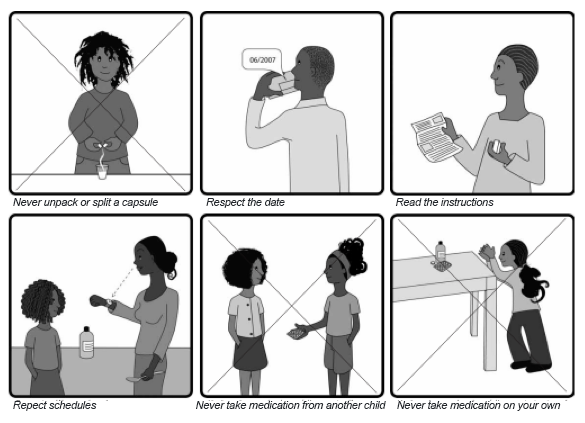For a medication to be effective and safe it is crucial to respect a few use rules.
One of the tasks of the medical staff is to inform the patient about how to use the medication.
Always respect the dose and the length of treatment recommended by the medical staff.
- If you take a lower dosage than recommended the medication may not be effective and consequently thought as unsuitable.
- Even if you have the feeling that you are not sick anymore, for example if your temperature has dropped, it is necessary to take the treatment until the end, that is to say respect the dose and the length of treatment prescribed by the medical staff to avoid a relapse.
- It would be wrong to think that you will cure faster if you take a higher dose of medication than prescribed. It could be on the contrary very dangerous.
- Respecting multi-times daily dosing of the medication is also very important. The effect of most medications is limited in time and that is why you need to take them in several times.
- There is also a specific way to take each medication and you will find it on the medication instructions : tablets and capsules for example need to be taken with water. Some have to be taken with meals, others between meals. Never hesitate to ask the medical staff to explain and show you how to use your medications for them to be effective.
CONTRAINDICATIONS
Certain medications can’t be given to some people because of their age, medical condition, possible allergies or because of they are taking other medications : it is very important to be aware and respect these contraindications.
Certain medications are not recommended for pregnant or breast-feeding women because they would harm the unborn child or the baby.
Lastly, certain diseases will forbid you from taking certain medications, and certain medications cannot be taken simultaneously.
It is therefore important to inform the medical staff of your medical condition, the treatments you have been prescribed, and the diseases you have or had in the past.
NEVER TAKE A MEDICATION WITHOUT A PRESCRIPTION FROM THE MEDICAL STAFF
- Similar symptoms (fever, headaches, stomach pains, vomiting ...) can be signs of very different diseases, or a close disease needing a different treatment. YOU THEREFORE CANNOT DECIDE ON YOUR OWN TO TAKE A MEDICATION THAT HAS ALREADY BEEN PRESCRIBED TO YOU IN THE PAST.
- In the same way IT IS DANGEROUS TO GIVE SOMEONE MEDICATION just because their symptoms are similar to the ones related to a disease you had in the past.
- YOU SHOULD NEVER GIVE A CHILD A MEDICATION THAT HAS BEEN PRESCIBED TO AN ADULT : children need suitable medications because their body doesn’t function in the same way as adults.
- ALWAYS AND ONLY BUY MEDICATIONS FROM THE OFFICIAL DISTRIBUTION CIRCUIT (chemists, pharmacies, hospitals, medical dispensaries, drugstores ...). Never buy medications from street vendors (see chapter 3)
NEVER LEAVE MEDICATION IN THE REACH OF YOUNG CHILDREN
- Medications often contain a lot of sugar and fruity flavours to make them taste nice. They sometimes have bright colours that are attractive to children.
- You need therefore to put your medications in a safe place out of the reach of young children so that they are not tempted to taste them.
- When medication has been prescribed to a young child, an adult needs to supervise and check they take the right dose and respect the length recommended by the medical staff.
CHECK THE EXPIRATION DATE
- A medication has a limited life span. The date after which you cannot take it any longer is written on the box. Always check a medication has not expired before taking it.
- Certain medications (such as eye-drops, syrups ...) have a very short life span. Make sure you respect it.
SIDE EFFECTS
- Certain medications may sometimes cause discomfort or a feeling of unease. You have to inform the medical staff of these side effects and they will advise you what to do in this case.
FURTHER INFORMATION
THE MEDICATION INSTRUCTIONS provide very important additional information. Read it carefully before taking the medication and keep it with you during the length of your treatment to be able to consult it regularly. It indicates :
- The name of the medication, its manufacturer and its composition.
- The medication’s manual : posology and schedules, expiration date and contraindications, method of administration, length of treatment.
- Preservation conditions (for example : keep ignition sources away, store away from humidity ...)
- Keep in mind that this is indicative additional information and that you always must respect the recommendations prescribed by the medical staff and written on the prescription or the health record. They can also be written directly on the medication box.
Quiz-summary
0 of 1 questions completed
Questions:
- 1
Information
How to use medication properly
THE « DOs » AND « DON’Ts »
Have a look at these pictures. Some of them show dangerous behaviour with medication. Can you tick them ?
You have already completed the quiz before. Hence you can not start it again.
Quiz is loading...
You must sign in or sign up to start the quiz.
You have to finish following quiz, to start this quiz:
Results
0 of 1 questions answered correctly
Your time:
Time has elapsed
You have reached 0 of 0 points, (0)
Categories
- Not categorized 0%
- 1
- Answered
- Review
-
Question 1 of 1
1. Question
Have a look at these pictures.
Some of them show dangerous behaviour with medication. Can you tick them ?Correct
Incorrect
Have a look at these pictures. Some of them show dangerous behaviour with medication.
Can you tick them ?
